Revolver (1973)
Directed by: Sergio Sollima
Written by: Dino Maiuri, Massimo De Rita, Sergio Sollima
Starring: Agostina Belli, Fabio Testi, Oliver Reed, Paola Pitagora
FRANCE/ITALY
AVAILABLE ON BLU-RAY: 16TH MAY, from EUREKA ENTERTAINMENT
RUNNING TIME: 111 mins
REVIEWED BY: Dr Lenera
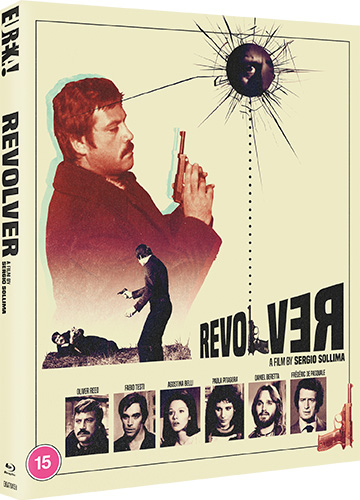
Businessman Harmokolas is shot dead on the streets and the police question singer Al Niko, who’s friend Jean Daniel is implicated as being the killer. Meanwhile rison warden and former police officer Vito Cipriani returns home to find that his wife Anna has been kidnapped by unknown men who demand Vito arrange the release of the relatively small-time crook Milo Ruiz. Vito enables Milo to escape from his cell, but then promptly takes him hostage himself, in order to ensure that the kidnappers keep their promise rather than just kill Anna and flee. Things go wrong quite quickly as it seems that the criminals aren’t playing straight, while Milo honestly doesn’t know who on earth would want him to be released from jail….
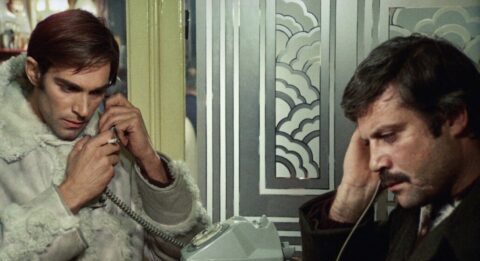
Inspired by rising crime, corruption and socio-political turmoil, the poliziotteschi [crime thriller] genre that existed alongside the giallo was often very popular in its native Italy, but rarely received much interest overseas. While I haven’t seen very many examples, I’d say that Revolver [which has nothing to do with the Guy Ritchie film of the same name, a film that I ‘m going to have to review at some point as I feel it’s underrated and even misunderstood] is equally typical of the genre and equally atypical of it. The likes of kidnappings, vigilantism and organised crime are staples, but Revolver is largely concerned with character and isn’t particularly interested in peppering its story with action; of course there’s some, but much less than usual. Despite this, one still can’t help but be absorbed and even excited as our two main protagonists proceed on their increasingly difficult mission while the plot thickens and themes of integrity and honour are developed, until we get a pretty downbeat ending which I guessed was coming about a minute before the main part of it took place, yet which still hit me with its reinforcement of the idea that said afore-mentioned values of integrity and honour matter little in such a corrupt world, and which overruled the fact that the main thrust of the plot actually makes little sense if you think about it. The really rather nihilistic piece is aided immensely by a very fine performance from Oliver Reed. We can all chuckle at tales of his boozing or lament that the bottle considerably weakened his career, but the truth is that he was a darn fine actor when he wanted to be, and he certainly proves that here.
The director is Sergio Sollima, who forms part of the Holy Trinitý of the Italian Western along with the other two Sergios; Leone and Corbucci, despite only making three films in the genre. Co-star Fabio Testi didn’t even want to do it until he noticed similarities to his Face To Face, a marvelous film that’s probably Sollima’s masterpiece. As long as you believe him of course, he ended up doing all of his own stunts including a roof jump that a stuntman was loath to do. As for Reed – well, it’s possible that none of what I tell you here will surprise you. He usually turned up for work already having had a fair bit to drink and was usually only good to work with until mid-afternoon when he’d had too much booze to do his job properly and would even become violent. In one scene Reed was supposed to unlock Testi’s handcuffs and drag him out of the car but Reed couldn’t get the small keys to fit in the cuffs. After three takes he got frustrated and threw the keys which happened to fall into a sewer drain. Testi was left in handcuffs for two hours until another key was found. He and Reed got on well though and would sometimes have drinking games on set, and once [or so the story goes], when Reed was disappointed that Testi was able to keep up with him, he chewed a light bulb to assert his superiority. Rather than employ the services of a fight choreographer, Sollima choreographed the fight scenes himself because he wanted each character to have a fighting style tailored to their personality. The film did disappointing business which Sollima blamed on the promotional campaign. It was re-titled Blood In The Street for its 1976 American theatrical release, with advertising comparing it to Death Wish which had just come out and been a hit, but sank there too.
The opening section is a bit disjointed as seemingly unrelated things are shown taking place, though don’t worry, everything comes together eventually. The first shot is a bit odd, with the screen filled with darkness as we can just about make out the legs of two people running. They are Milo Ruiz and Jean-Daniel Auger, and Jean-Daniel is wounded. As police sirens get louder, they reach their car and escape. Cut to the next morning and the two are by a river with Jean-Daniel dying in a rather moving moment with some lovely shots of the run rising. The scene certainly succeeds in creating sympathy for Milo when we next see him. Now we see the assassination of Harmokolas, and learn that Jean-Daniel was his bodyguard. In fact Jean-Daniel is also supposed to have been killed by a passing train [so pushed into the path of one then], and this is before it’s clear that the person who died in the first scene was actually Jean-Daniel. Then we meet Vito and his wife Anna, and they’re cleverly introduced in a way so that it parallels the introduction of Milo and Jean-Daniel, the camera focusing on their bottom halves, her feet on his, as they begin some sexy time, though our expectations that this will be a strong love scene are defeated. He’s called away to deal with trouble at the prison which he’s the warden of, and you have to laugh when Reed says a line like “No, he’s not mad, he’s drunk”. When he goes back home she’s gone, and a phone call gives him his instructions. He begins to ring the police, but then puts the phone down. He’s going to deal with this himself, beginning with going into Milo’s cell and punching him in the chest. In fact he’ll attack Milo quite often in the next half an hour. Milo’s cellmate mentions a guy named Grappa as someone who knows what all this is about, but all Grappa seems to know is that Milo’s not a very successful crook. So Vito decides that Milo’s going to escape from jail, leading to the film’s sole daft scene, with just a few wooden beams in the way before he jumps and climbs all over the outside without being seen.
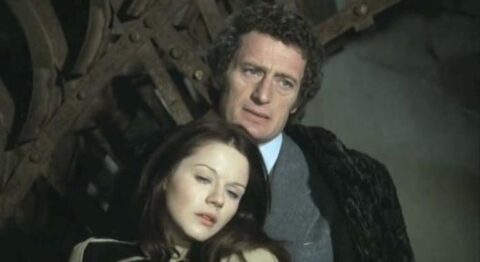
Vito’s waiting with a car and orders him to get in, which sure pleases Milo. “I’m glad about that, we’re have a few laughs together”. The handing over of Anna is supposedly arranged, but of course it doesn’t go as planned. A colleague and friend of Vito’s tracks the kidnappers to an isolated farmhouse, but is then killed while telling Vito over the phone. Anna is about to be killed or maybe have something even worse happen to her, but then the architect of the kidnapping comes to the fore and takes Anna away with him. This happens several times; as soon as we our two main characters seem to be catching up with Anna, she’s whisked out of reach again, creating an almost agonising dynamic. Milo finally succeeds in getting the upper hand over his kidnapper, but when ordered to finish the job he’s hesitant, in an especially well played moment from Testi. An agreement is made whereupon Milo will help Vito and Vito will then let him go. The search goes from Italy through the Alps to France, and both Vito and Milo begin to change, each assuming some traits of the other. Vito almost kills a man in a wild lorry dash. “You were loving every second of it” says Milo, and Vito doesn’t disagree with him. Milo develops some goodness, as well as having a dalliance with a people smuggler called Carlotta. Paola Pitagora is third billed in the credits, yet the character almost seems like an afterthought, screenwriters Dino Maiuri, Massimo De Rita and Sollima himself maybe deciding that Testi needed a love interest, perhaps as a reward for putting up with Reed. Yet their work is generally good, their story very well worked out as it proceeds inexorably to its downbeat final act where several things are thrown at you before the climactic punch which is especially clever because, while it hits you with its downbeat nature, it’s also happy in one respect, yet we can only think about the former.
There are plenty of suspense-filled moments, though only one major action sequence, and even that’s quite short. Yet we become so involved that don’t really miss such things. There are still a fair few shootings and beatings, plus a few breasts, but Maiuri, De Rita and Sollima was clearly going for something a bit higher than simple thrills. The transference of character traits isn’t as developed as it perhaps might have been, and certainly not as much as in Face To Face, yet we’re still invited to consider how the person inside us might be very different to the person that people actually see, and whether the lives of certain groups within society are less important than others. The story also bravely suggests that being truthful, even doing the right thing, is largely pointless in such a crooked world. If you can’t beat ’em join ’em. Reed constantly looks like he’s about to literally explode at any second, restraining himself which allows his face to show all of his character’s torment, anger and defeat, and displaying his expertise in brooding. Nobody broods like Reed, and thank god for all those reaction shots so that we can properly see this. He’s especially powerful in the final section, though his American accent is a curious choice though and comes and goes. Testi is a good foil, though maybe he seems too happy and cheerful some of the time, even biting into a snowball like an apple at one point and with a strange habit of throwing cigarettes onto the ground so they stand up. Outside of these two, the most interesting character is Daniel Beretta’s Al Nico, the chart topping singer involved with the mob while wearing some daft outfits and, when presented with female company for the night, immediately palming her off to a much older guy.
Beretta sings the theme song on screen which is then heard several times later, though it’s of course the original Ennio Morricone instrumental arrangements, one of which turned up in Inglorious Basterds, that come off much better. Much of the score is driven by a forceful theme that suggests progression and resembles a much slower version of his main theme from The Untouchables. A much gentler theme, using the opening of Fur Elise, is written for Anna, and some lighthearted oddness also turns up in a typically strong effort from The Maestro in arguably his most creative period. As for Sollima, he seems to be attempting a bit more visual flair than usual; the obligatory extreme zooms are artful and there’s even some deep focus, including a John Frankenheimer-style huge face at the front of the left side of the screen. A lot of outdoor scenes seem to have been shot by cinematographer Aldo Scarvarda in the early morning, providing visual consistency and a slightly strange atmosphere, the sun constantly threatening to burst into the gloomy proceedings but never succeeding. Made with thought and care, Revolver is almost a genuine crime classic and has far more resonance and depth than we perhaps have a right to expect. But it’s harsh and miserable. After all, “Society has many ways of defending itself: with red tape, prison bars, and the revolver.” Thanks for reminding us of that, Sergio.
SPECIAL FEATURES
Limited Edition O-Card slipcase [2000 copies]
1080p presentation on Blu-ray from a 4K restoration
English and Italian audio options
Optional English Subtitles, newly translated for this release
Brand new audio commentary by author / critics Kim Newman and Barry Forshaw
Though listed as a solo effort by Newman elsewhere, this actually pairs him with somebody I’d never heard before on these things. Though Newman leads and says more, Forshaw offers much insight himself. The film is much praised, even though it’s remarked that Testi is given short shrift in the final act, and Sollima is described as a political filmmaker but not in a didactic or cartoonish fashion, while there’s also discussion as to whether actors like Reed thought making such films was a step down, and about Reed himself, one of several stars whose acting ability hasn’t been recognised enough because of their notoriety.
“Stephen Thrower on Revolver” 2022 interview with film scholar Stephen Thrower, author of “Nightmare USA” [22 mins]
Thrower is always a welcome presence and here he covers a good amount of ground, beginning with Sollima’s time at Centro Sperimentale di Cinematografia where propaganda was generally the order of the day yet which also was a place where many filmmakers who had opposite views to the Mussolini government were strangely able to flourish. He also covers some – though not all – of Sollima’s other films, compares him to his son Stefano who’s also a filmmaker, and identifies a commonSollima theme; our expectations of people are upended and twisted.
“Tough Girl!” 2022 interview with actress Paola Pitagora [10 mins]
Pitagora, who plays Carlotta, recalls working on the film after describing her former image as “an icon of purity fore Italian audiences”. She tells of how Reed let go of the clutch while filming the scene where she and others are getting on a truck, causing so much bruising that she wore sunglasses and was filmed at a distance afterwards. She also says that Morricone, during a climate of feminism, told her that “a woman’s place is at home, minding the children and making dinner“! She also seems disappointed that was wasn’t much in demand as an actress.
“Action Man” 2015 interview with actor Fabio Testi [17 mins]
I couldn’t trace where this interview came from; it’s certainly not the same one that was on the North American Blue Underground DVD with Testi and Sollima. Anyway, it finds Testi nice and honest about his career and even his acting which he feels wasn’t very good in his early days. He tells of his great friendship with Enzo Castellari, says that Lucio Fulci’s persona as “a villain disgusted by life” was a front, and mentions how he likes working with new directors. To make up for no stories about Reed, we have him telling of how he, a former stuntman, did every character’s stunt in the first film he properly acted in.
English “Revolver” Opening and Closing Credits [6 mins]
Italian Theatrical Trailer [3 mins]
U.S. “Blood in the Streets” Theatrical Trailer (2 mins]
Two “Blood in the Streets” Radio Spots [2 mins]
A Limited Edition collector’s booklet featuring two new essays by author Howard Hughes; one covering the background to the making of Revolver, and an extensive piece on Ennio Morricone’s “Eurocrime” soundtracks [2000 copies]
Eureka’s release of ‘Revolver’ is surprisingly short on tales of its notorious star, but then they obviously wanted to focus on the film itself, which is understandable; it’s an intelligent crime drama that deserves some serious critical attention. Highly Recommended.




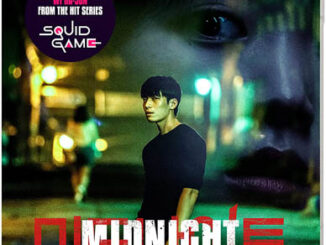
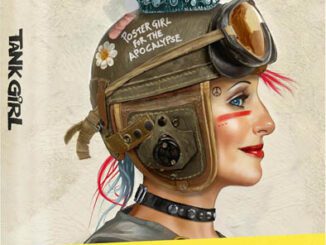
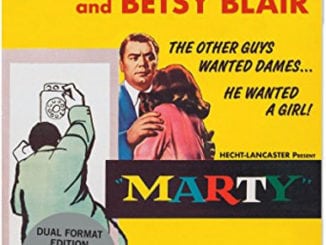
Be the first to comment